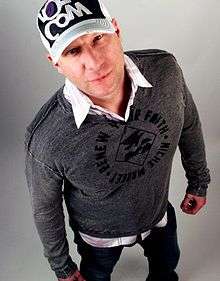DJ Icey
| DJ Icey | |
|---|---|
 DJ Icey. | |
| Background information | |
| Birth name | Eddie Pappa |
| Also known as | DJ Icee, The King of the Funky Breaks |
| Born | Orlando, Florida, United States |
| Origin | Florida |
| Genres | Electronic, breakbeat, hip hop, progressive house, trance |
| Occupation(s) | Disc jockey, Producer, Remixer |
| Instruments | Turntable, Sampler |
| Associated acts | DJ Baby Anne |
| Website |
www |
DJ Icey, (born Eddie Pappa), is an American DJ, electronic music producer, and remixer, credited by Allmusic as having helped to "jump-start the increasingly fertile dance scene in and around Orlando, FL, during the '90s".[1] E, the Incredibly Strange History of Ecstasy credits him as "the prime founder of the Funky Breaks and the Florida Breaks.[2] 1999's Rave America indicates that "the preoccupation with backbeats" characteristic of the Orlando sound was developed by DJ Icey.[3] Rolling Stone writes that DJ Icey was "one of the original Florida DJs responsible for kick-starting the American progressive house and trance scene".[4]
Biography
Icey was born in Florida. Originally named DJ Icee, he had to change his name because a local Orlando ice cream manufacturing company by the same name threatened to sue him.[3] Known for marrying the diverse strands of Chicago Hip house and English break-beat house, he rose to prominence DJing for the now defunct Orlando club The Edge, a position he held from 1991 to 1996.[2][5] In 1993, he created his own label, Zone,[6] named in honor of the UK labels O-Zone and D-Zone.[3] In 2000, CMJ New Music Monthly described him as "an expert in funky, sped-up hip-hop",[7] and by 2001, Billboard was listing him along with Crystal Method, DJ Micro and Überzone as "perennial figure[s] in the burgeoning funky breaks underground scene."[8]
DJ Icey released his own music under his name and City Wide Allstars, and also remixed music for Groove Armada, Paul Oakenfold and Kosheen.[9]
Billboard charts
DJ Icey has had several albums chart for Billboard, with six charting singles. The Hot Dance Music/Maxi-Singles Sales charts have included "City of Groove" (1998, #44), "Not a Test" (1998, #43), and "Dreams" (2003, #16).[10] "This Is How My Drummer Drums" charted on the Dance Music/Club Play Singles chart (1998, #32), while the Hot Dance Singles Sales chart has included "A Little Louder" (2003, #16) and "And Go!" (2004, #16).
Select discography
- Break to the Dance (1996)
- The Funky Breaks (1997)
- Generate (1998)
- Continuous Play (1999)
- Essential Mix (2000)
- Mixed (2001)
- Essential Elements-Dj Icey The Breaks Element (2001)
- Different Day (2003) (#8 on the Top Electronic Albums chart, #41 Top Independent Albums)[11]
- For the Love of the Beat (2004) (#15 Top Electronic Albums chart)[11]
- Twisted (2005)
- Y4K (2006)
- Disco Rodeo (2007)
- Offshore Jedi (2008)
- Amplified (2009)
- What You Feel (2010)
- Flash The Message (2011)
- One Big Room (2012)
References
- ↑ "DJ Icey, Biography". allmusic. Retrieved 2009-12-10.
- 1 2 Pilcher, Tim (2008). E, the Incredibly Strange History of Ecstasy. Running Press. p. 132. ISBN 0-7624-3184-9.
- 1 2 3 Silcott, Mireille (1999). Rave America: new school dancescapes. ECW Press. p. 127. ISBN 1-55022-383-6.
- ↑ "Loud Rocks, Ryan Adams Lead New Releases". rollingstone.com. September 5, 2000. Retrieved 2009-12-10.
- ↑ Silcott, 127-128.
- ↑ Pilcher, 129.
- ↑ Werde, Bill (July 2000). "Clubbing to America". CMJ New Music Monthly (83): 67. ISSN 1074-6978.
- ↑ Roseberry, Craig (August 4, 2001). "Hard-touring Überzone peers into 'The Future' on Astralwerks". Billboard. Retrieved 2009-12-10.
- ↑ FFWD Staff (August 23, 2001). "Beat Boutique: Urban Groove Preview". FFWD Weekly.
- ↑ "DJ Icey, Billboard Singles". Allmusic. Retrieved 2009-12-10.
- 1 2 "DJ Icey, Billboard Albums". Allmusic. Retrieved 2009-12-10.
External links
- Official website
- Hartlage, Kirk (2004-06-01). "DJ ICEY (interview)". REMIX Magazine. Retrieved 2008-05-21.
- Tomasco, Susan (2004-06-01). "DJ Icey Interview". Lunar Magazine. Retrieved 2008-05-21.
- DJ Icey at Allmusic